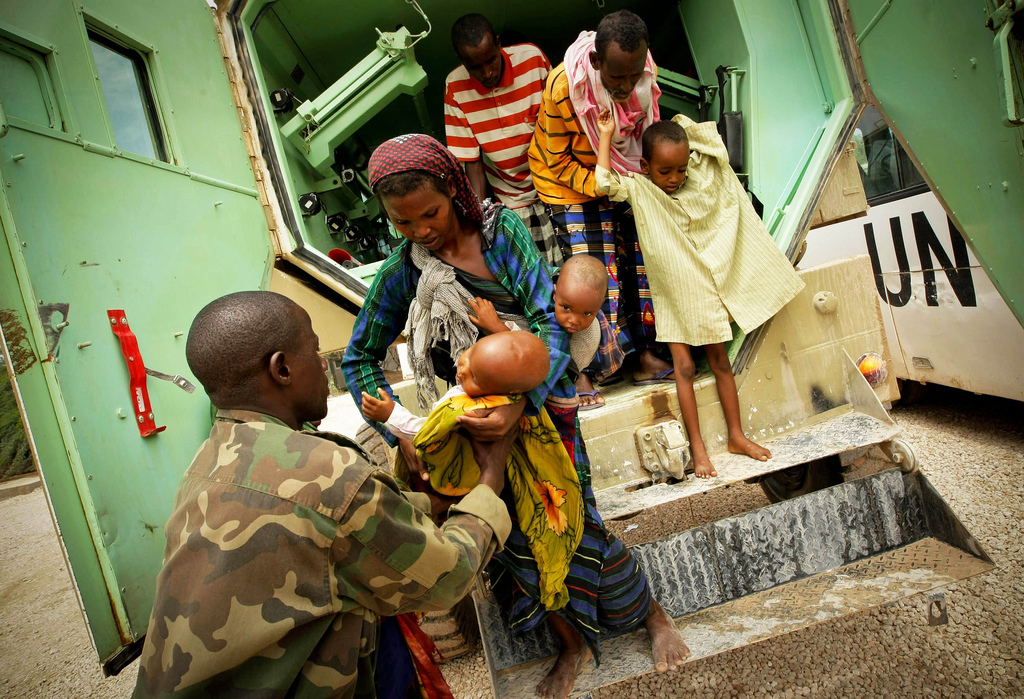
African Union assists Somalis in famine crisis (Stuart Price/United Nations/Flickr/CC BY-NC-ND 2.0)
Feminist Participatory Action Research and the localisation agenda
By Philippa Smales
19 February 2018
Those of us in the development sector often talk about “doing ourselves out of a job”; it was even the vision of USAID Administrator Mark Green in terms of the objective of foreign assistance. However, the sticking point is that we may not really know how to achieve that ultimate end goal, and it also seems that very little that we do are steps towards achieving that goal.
In the humanitarian sector, there has been a lot of talk recently about the ‘localisation’ agenda that emerged through the 2016 World Humanitarian Summit (WHS) process. There, at least, there are some agreed-upon processes, a movement even, that if implemented will lead closer to the local ownership and control of the process of development. You may be mistaken to think that the localisation agenda is all about the funds, and that has been the focus and sticking point in many discussions, justified by the report that in 2016 less than 2% of the annual global spend on humanitarian action went directly to national actors (by 2020 this should be 25%). However, localisation also has a political agenda – it is also about shifting power relations and bringing decision-making down to a local level.
As the humanitarian sector starts to embrace (or at least discuss) localisation, questions should also be raised about the localisation agenda for development work. If the humanitarian localisation agenda is implemented after the crisis or disaster is addressed by local and national organisations, do we then expect to take that power away in the implementation of post-disaster development projects?
Feminist Participatory Action Research (FPAR) is an approach that presents strong potential for pointing us in the right direction. FPAR builds on research methods developed as Participatory Action Research (PAR) but integrates feminist perspectives and processes. With a deliberate focus on gender as an analytic category in order to strengthen participatory approaches to research, it ensures that the participation of women is not subsumed under that of ‘the community’. Therefore, FPAR ensures gender issues are included and localises research, and the programs it informs, in a way that a lot of current development practice does not.
FPAR is not like other research methodologies that see communities and women as subjects to be studied and researched – they are not passive, but an integral part of the research process. The purpose of doing FPAR is to change systems and structures towards the improvement of the lives of marginalised women, and the process emphasises local knowledge and understanding of the context.
To assist in beginning the movement towards localisation in development, FPAR is not only a way of understanding and communicating the experiences of women, or of the community, but a way to build the capacity of the women and of the community to organise, to speak, to determine their needs, and to determine what development frameworks will benefit or work for them and their situation. The research process strengthens the solidarity and the understanding of women in development agendas. They do not just collect data and they are not just consulted, instead they own the research agenda, participate in the analysis, and make the decisions about the outcomes and actions.
FPAR is research which inherently aims to generate real world impact. Its purpose is not to be written up to sit on a shelf, or to be talked about at academic conferences. FPAR is currently being used in the region, for example by women’s regional rights organisation Asia Pacific Forum for Women, Law and Development (APWLD) across its programing. From its secretariat in Thailand, APWLD has been successfully using the model for at least six years. There is also the example of the Australia-Indonesia Partnership for Gender Equality and Women’s Empowerment, or MAMPU, funded by the Australian Government, supporting groups using the FPAR approach since 2012. The approach has yet to be embraced widely by Australian NGOs, although this may change.
Whilst FPAR will not do away with the need for development professionals or external technical support, it does have strong potential to ensure that requests of assistance will come from communities themselves. International NGOs can then move to a position of enabling or assisting, rather than implementing (see what that may look like here), shifting traditional power relationships away from researcher-subject and development professional-beneficiary binaries.
In a time when DFAT is strongly committed to being at the forefront of efforts to empower women and girls, strengthening women’s participation in strategic planning of development though FPAR may be a way to for DFAT to ensure that more than 80% of aid investments effectively address gender issues in their implementation.
The RDI Network is supporting an evaluation of the Climate Justice focused FPAR programme of APWLD, and will be bringing the approach to Australian NGOs in a workshop later in the year.
For further background see Gatenby, Bev, and Maria Humphries, 2000, ‘Feminist Participatory Action Research,’ Women’s Studies International Forum vol. 23, no. 1, pp. 89–105.
About the author/s
Philippa Smales
Dr Philippa Smales is the Network and Partnerships Manager for the Research for Development Impact (RDI) Network.
